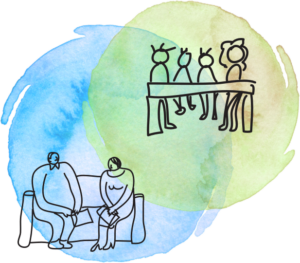Need immediate support?
Please call 8-1-1 for 24/7 general health information and advice. Indigenous people across Canada can also call the toll-free Hope for Wellness Helpline at 1-855-242-3310.
Need immediate support?
Please call 8-1-1 for 24/7 general health information and advice. Indigenous people across Canada can also call the toll-free Hope for Wellness Helpline at 1-855-242-3310.
There are 2 medications that are called “first-line” treatments for alcohol addiction. They are naltrexone and acamprosate. “First-line” medications are seen as the most dependable choices for treating alcohol addiction. This means that scientists have done research and found that these medications work well for a lot of people.
Naltrexone (Revia)
Acamprosate (Campral)
I didn’t know there were any other options until I went to an addictions treatment centre where I was referred to a psychiatrist who prescribed me naltrexone.
There are 2 medications known as “second-line” treatments for alcohol addiction. They are gabapentin and topiramate. These medications have less research supporting how well they work and are usually tried when the “first-line” medications have not worked.
Gabapentin (Neurontin)
Topiramate (Topamax)
Gabapentin can help, but it doesn’t put alcoholism into remission. I didn’t take it as prescribed and quickly became dependent on it. You have to take care of your mental health too.
I needed to try a number of medications before finding a combination that worked best.
There are also some short-term free and low-cost substance use counselling services that are publicly funded in different provinces and territories—they usually require a referral from a health care provider and are typically only offered in cities.
There are different types of counselling that can help with alcohol use disorder: one-on-one counselling, couples counselling, family counselling, or in a group with other people. It’s important to find the right type of counselling that suits your needs and goals. Combining counselling with medication treatment can be more effective, so it’s a good idea to talk to your health care provider about your options.

To get an idea of the Canada-wide and region-specific health and support services you might be able to access to help with your alcohol use, check out this Government of Canada website.
Cognitive behavioural therapy
Family-based therapy
Mindfulness-based therapy
One of the most important things is honesty. I wouldn’t tell them how much I was really struggling, but once I got honest, there was hope.
Community programs are resources in your area that can help with alcohol problems. These programs can include peer support groups, inpatient and outpatient treatment programs, supportive recovery housing, and other organizations that offer help and guidance with challenges related to alcohol and promote long-term well-being.

For more information about AA and SMART Recovery, click here.
I have found a close group of recovery friends that I am now free to share my experience, strength, hope and struggles with any time I need to. The trust that I would not allow into my life and relationships has returned. I am now proud to be a person in recovery and fully transparent and open about my past and emerging recovery story. It is so much easier and free to be authentic, I am who I am, I have a past and it’s all OK.
Intensive outpatient treatment programs
Inpatient treatment programs
Supportive recovery housing
Peer support groups
With every effort on the path to sobriety, there was something each experience gave me as an added tool towards getting sober. And getting sober was never the end goal. Getting back to the world of living was.